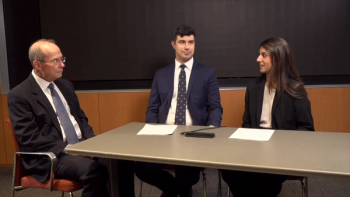
Baseline factors and how they affect DME resolution
Dr. Katherine Talcott discusses baseline factors—CST thickness, hemoglobin A1C, and baseline vision—and their effects on DME resolution.
Katherine Talcott, MD, sat down to discuss how baseline factors affect diabetic macular edema (DME) resolution. This study was conducted using VIVID/VISTA data sets to assess baseline vision, CST thickness, and hemoglobin A1C.
Dr. Talcott is retina specialist at the Cole Eye Institute at the Cleveland Clinic.
Video transcript
Katherine Talcott, MD: One of the things that we're interested in as retina specialists looking into is diabetic macular edema and trying to see sort of what baseline risk factors are associated with how quickly the edema gets better if you treat it.
So one of the ways in which we sort of looked at this is by utilizing the VIVID and VISTA data sets where patients were either treated without anything, with laser, or anti-VEGF treatment. And we try to sort of see if there were any baseline characteristics that were associated with faster rate of clearance of the diabetic macular edema.
One of the things in particular that we were interested in is if the degree of diabetic retinopathy severity was associated with how fast patients clear their edema. But we also looked at sort of other baseline characteristics, including baseline vision, how thick or how large, the CST was on the OCT and what the hemoglobin A1C was.
We utilized the VIVID and VISTA data set to be able to sort of examine these risk factors, and I think the results that we found were somewhat interesting. Patients who had thicker CSTs at baseline took longer to sort of clear their edema, which sort of makes sense, because if there's more fluid there, it takes a little longer to clear.
We also looked at baseline vision. Patients who had better vision actually took longer to clear their edema, which is interesting. I think we can sort of speculate why that might be the case, maybe their edema sort of existed for longer than patients who had worse vision and thus took a little longer to clear, but I think that was sort of a curious finding that we found.
One of the things that we were really interested in is to see if baseline diabetic retinopathy severity would affect sort of how quickly swelling cleared, and it didn't at all. It wasn't associated with that.
We normally sort of think about diabetic retinopathy severity and diabetic macular edema as sort of being sort of separate entities that aren’t related; the results that we found sort of go along with that, that they are—that they are separate.
We're also interested in sort of how well a patient's diabetes is controlled so looking at their A1C, if it affects how quickly their edema is cleared. And there was no association either.
So I think overall, the results that we found are interesting. I think, in particular, the vision findings, and the diabetic retinopathy severity findings are sort of interesting, but I think also help us as clinicians be able to know what to expect, as we begin treating the patients.
Patients who often have diabetes tend to be younger than some of our other retina patients, and often they have a lot of health appointments going on at the same time. So lots of sort of burden on them. But they're often patients who are still working. They're not like our retired patients who have like AMD. And so they want to know if their vision is impaired by macular edema, sort of how fast they're going to be able to see again. If they're not able to drive because of this, how quickly are they able to get back to that?
So I think this gives us some factors that we can look at to sort of prognosticate once we initiate treatment sort of how they're going to do. So I think for us, those are sort of the findings that we found that were interesting and can help us guide patient treatment and patient expectation.
One of the things that's interesting to us is we looked at anti-VEGF treatment and how this is correlated with baseline factors. One of the correlates that might be interesting to look at is looking at patients who were treated with steroids for diabetic macular edema and seeing if we found sort of any different findings. That might be able to tell us—because anti-VEGF treatment is sort of impacting a more VEGF-dependent disease, but do we see the same findings with steroids or not? I think that's one of the next steps that would be sort of interesting for this project.
Note: This transcript has been lightly edited for clarity.
Newsletter
Don’t miss out—get Ophthalmology Times updates on the latest clinical advancements and expert interviews, straight to your inbox.





























